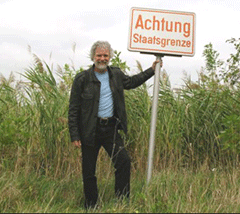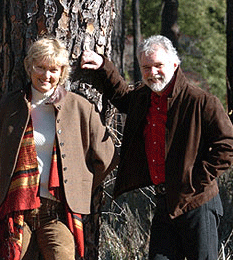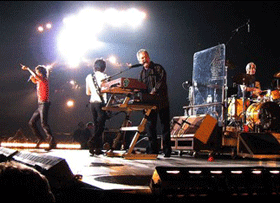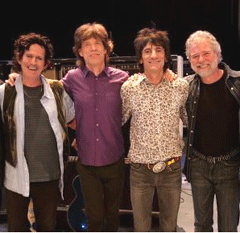A Rolling Stone Gathers Trees
Air Date: Week of May 2, 2008

While on tour in Germany, Chuck Leavell campaigned for sustainable forestry. (Courtesy of Chuck Leavell)
When keyboardist Chuck Leavell isn't on tour with the Rolling Stones, he's hanging out at his Georgia tree farm or lobbying the government to support sustainable forestry policy. Host Bruce Gellerman and Chuck listen to songs from his latest solo CD and talk about his fondness for forests.
Transcript
GELLERMAN: They’re known as the greatest rock ‘n roll band in the world.
[MUSIC: Rolling Stones “(I Can’t Get No) Satisfaction” from ‘Hot Rocks 1964-1971’ (Abkco Records – 2002)]
GELLERMAN: No moss grows on these Rolling Stones – their recent tour lasted two years. When the Rolling Stones ended their tour in 2007, their keyboardist, Chuck Leavell, known as the fifth stone, kept going, rolling and recording around Europe. And now, his latest double CD set has just been released. It’s called ‘Live in Germany: the Green Leaves and Blue Notes Tour 2007.’
[“Route 66” from ‘Live In Germany – Green Leaves And Blue Notes Tour 2007’ (Evergreen Arts – 2008)]
GELLERMAN: Chuck Leavell is not just a musician. He’s also an award-winning advocate for sustainable forests, and the author of three books about trees, including his latest for children: “The Tree Farmer.” Chuck Leavell, joins me from a studio in Southern California. Chuck, it’s good to talk to you.

Chuck Leavell with his wife Rose Lane in their tree farm in Georgia. (Courtesy of Chuck Leavell)
GELLERMAN: You know, I was listening to your new album and noticed in the liner notes that you say you’ve got three passions: your family, your trees, and your music. How come you put your music after trees?
LEAVELL: Well, I’m not sure that’s in any particular order. Family first – I just feel like I’m the luckiest guy in the world, man, I have a wonderful family: two beautiful daughters; Roseline, my wife, and I have been together over 35 years now. And of course to be able to play music with all the different artists that I’ve been fortunate to work with is a joy, and then, somewhere along the way I got interested in trees and forests and that has become equally a big, big passion for me.
GELLERMAN: You’ve got a 2,200 acre farm – a Charlene Plantation, I think you call it.
LEAVELL: That’s right. Some of this land, Bruce, goes back to my wife’s heritage. The particular property that we live on and that she inherited from her grandparents was something that they bought back in the 1930’s.
GELLERMAN: So it’s a tree farm in Twiggs County (laughs).
LEAVELL: (laughs) That’s right. That is absolutely right. Twiggs County, if you put your finger on the map right in the center of Georgia, you’ll be pressin’ on top of my head.
[MUSIC: “Georgia On My Mind” from Live In Germany – Green Leaves And Blue Notes Tour 2007 (Evergreen Arts 2008)]
GELLERMAN: So is Georgia on your mind always?
LEAVELL: (laughs) Of course, of course. I love my home, man, living where I live and being involved in forestry provides an incredible balance for me. You know, when you’re out touring with Rolling Stones or some of the other artists I’ve been fortunate to work with, it’s a very electric atmosphere. There’s a big buzz going on all the time, people around you, big crowds, lots of excitement. After a while, all of that tension, all of that feeling, all those vibrations begin to take a little bit of a toll. Even when I’m on the road, if I can find a green space, a park, a forest to visit, and certainly, when I do get home and walk amongst the trees and hear the sound of the wind through the pines, or the sound of the crunch of leaves under your feet, it provides a certain balance that for me is essential.

Chuck Leavell playing with the Rolling Stones. (Courtesy of Chuck Leavell)
LEAVELL: Well that’s right. This resource of wood is probably our most precious resource that we have in this country. It’s organic, it’s natural, and it’s renewable. The number of things that come from the forest that we use, whether it be fine furniture, whether it be building materials for our homes and schools and churches, or whether it be paper products that we use, books, magazines, newspapers, whether it be musical instruments – just about every musical instrument has an element of wood in it, and even – let’s take a saxophone – even that won’t work unless you have that wooden reed. So when you put your mind to it and you begin to realize the gifts of the forest, you begin to realize how important this resource is to America and to the world.
And now, what’s interesting, is that we’re talking about other gifts that the forests give us, like the ability to combat climate change. We all know that trees sequester carbon. Also, biofuels – there’s been a lot of discussion lately about the effects of corn to make ethanol, and what that’s done to the price of corn, and how that has had an ill effect. But ethanol can be made from wood chips. So, these are exciting things, and it’s just something everyone needs to realize – all the wonderful things that the forest gives us.
GELLERMAN: But growing trees, getting wood, requires patience, and I can’t imagine your touring with the Rolling Stones involved much patience – I mean, they went worldwide. Your role with the Rolling Stones, as I understand it, on this tour was, in part, not just play with them but to be the program manager – decide what the playlist was.
LEAVELL: You know, I’ve been with the band now for 25 years, and the role has evolved. Mick and I began to work together on the set list even before the band would go on tour, when we were in the rehearsal stage. And because every tour you wanna try to do a little something different – certainly there’s the iconic songs, “Brown Sugar,” “Satisfaction,” “Jumping Jack Flash,” that you’re more or less obligated to play every show – but then there’s a lot of space for change. And we would get together on interesting ideas and songs that were a little more obscure.
GELLERMAN: I have a clip of you and Mick Jagger – I want you to listen to it. It’s pretty funny.

While on tour in Germany, Chuck Leavell campaigned for sustainable forestry.
(Courtesy of Chuck Leavell)
JAGGER: Yeah, sure, sure, no, I’m getting it – I’m down to that –
LEAVELL: But I’m not doing it that much, because I don’t want it to be too pretty, you know –
JAGGER: No, don’t want it to be too pretty –
LEAVELL: No –
JAGGAR: – and no country
LEAVELL: No, no, no, no it ain’t going to be country. Just cause I’m from Georgia, you know?
JAGGER: (laughing)
JAGGER: Don’t get defensive!
[Leavell laughs.]
GELLERMAN: (laughs) He didn’t want it too country.
LEAVELL: (laughs) No, not too country. Although it’s funny, because the Stones as a whole loved country music. When you think of songs like “Faraway Eyes” or “Dead Flowers,” you know I mean, that’s straight country, man.
GELLERMAN: Well, I’m thinking of “Honky Tonk Woman,” which you have on your latest CD.
LEAVELL: Ah, yes. Love that cowbell.
[COWBELL; APPLAUSE; MUSIC STARTS]
LEAVELL: Well, you know, “Honky Tonk Women” is a special song for me. I can remember where I was when I first heard that song very well. I was in one of my first bands. We were living in Nashville, Tennessee. The guitar player came running in the door with a 45 and said, ‘I’ve got it! I’ve got it!’ And I said, ‘you got what, man?’ He said, ‘I was listening to the radio, I heard this new Stones song, it drove me crazy, I pulled over on the side of the road to listen to it, I went straight to the record store, I bought it, and here it is!’ And it was Honky Tonk Women, and we listened to that record all day long. We dissected it upside-down and backwards and I’ve just always loved that tune.

From left to right; Keith Richards, Mick Jagger, Ronnie Wood, and Chuck Leavell. (Courtesy of Chuck Leavell)
[MUSIC: “Honky Tonk Women” from Live In Germany-Green Leaves And Blue Notes Tour 2007 (Evergreen Arts 2008)]
GELLERMAN: Back in 2003, you played the national anthem for President George Bush. He referred to you as a tree raiser (laughs).
LEAVELL: (laughs) Well, I think anybody that’s followed President Bush is familiar with ‘Bushisms,’ and I think he was at a loss of words as to what to call me. ‘He’s a tree-raiser, or a tree-grower, or whatever you call them!’ That’s what he said (laughs). But the event was actually the signing of the Healthy Forest Restoration Act. And I was very, very pleased that it was passed, because I did maybe have some small role in helping that along. I went to Washington D.C., and I do sometimes go up there and discuss forest policy with the leaders in Congress, and sometimes with the, even the White House, and I was invited to come up there and do the national anthem (laughing).
GELLERMAN: Well, it’s been a real pleasure there, Chuck. What song should we go out on?
LEAVELL: I wrote a song called “Savannah” on my next-to-last CD. It’s called Southscape. If people, anybody out there, have been to the city of Savannah, the picture I was trying to paint was of the huge, beautiful live oak trees that are there with the Spanish moss hanging down from them. It has a beautiful, sweet feeling to it.
GELLERMAN: Well, Chuck, thank you very much. It’s been a real pleasure.
LEAVELL: Great. Thanks, Bruce.
GELLERMAN: Chuck Leavell, the fifth or sixth Rolling Stone depending on how you count them, is a tree farmer, author, and keyboardist. His new double CD is called ‘Live in Germany: Green Leaves and Blue Notes Tour 2007.’
Links
Living on Earth wants to hear from you!
Living on Earth
62 Calef Highway, Suite 212
Lee, NH 03861
Telephone: 617-287-4121
E-mail: comments@loe.org
Newsletter [Click here]
Donate to Living on Earth!
Living on Earth is an independent media program and relies entirely on contributions from listeners and institutions supporting public service. Please donate now to preserve an independent environmental voice.
NewsletterLiving on Earth offers a weekly delivery of the show's rundown to your mailbox. Sign up for our newsletter today!
 Sailors For The Sea: Be the change you want to sea.
Sailors For The Sea: Be the change you want to sea.
 The Grantham Foundation for the Protection of the Environment: Committed to protecting and improving the health of the global environment.
The Grantham Foundation for the Protection of the Environment: Committed to protecting and improving the health of the global environment.
 Contribute to Living on Earth and receive, as our gift to you, an archival print of one of Mark Seth Lender's extraordinary wildlife photographs. Follow the link to see Mark's current collection of photographs.
Contribute to Living on Earth and receive, as our gift to you, an archival print of one of Mark Seth Lender's extraordinary wildlife photographs. Follow the link to see Mark's current collection of photographs.
 Buy a signed copy of Mark Seth Lender's book Smeagull the Seagull & support Living on Earth
Buy a signed copy of Mark Seth Lender's book Smeagull the Seagull & support Living on Earth

